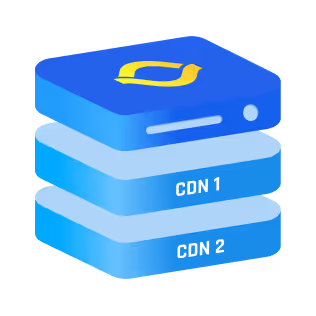Trying to speed up your website or application globally can feel like a daunting task, especially when your audience is spread across different continents. The challenge intensifies when you aim for consistency in performance, regardless of a user's location.
This shortfall is particularly evident when a single CDN faces network congestion, performance issues, or outages. Thankfully, technology has evolved, introducing tools like the CDN Orchestrator to address these issues head-on.
What is CDN Orchestrator?
A CDN Orchestrator is an advanced tool that dynamically manages and optimizes the distribution of digital content across multiple CDNs. It doesn't just rely on a single CDN provider; instead, it intelligently routes traffic across different CDN networks based on real-time data about network conditions, user location, CDN performance, and other critical metrics.
The orchestrator can make instant decisions to switch traffic to the best-performing CDN at any given moment by continuously monitoring the performance of each CDN in the pool, providing a real-time alternative to service disruption.
How CDN Orchestration Works (Under the Hood)
When a user requests content, the orchestrator evaluates real-time CDN performance monitoring data, including latency, availability, cache hit ratio, and throughput, to determine the most efficient path.
Request Flow:
- User Request → Hits the orchestrator (DNS- or API-based).
- Real-Time Analysis → Monitors CDN health across providers.
- Routing Decision → Based on geography, performance, content type.
- Traffic Distribution → Sends request to the optimal CDN.
- Failover Trigger (if needed) → If performance drops or fails, another CDN takes over instantly.
This real-time decision engine ensures content is always served from the fastest and most reliable edge, reducing load times, avoiding congestion, and maintaining uptime globally.
{{cool-component}}
Key Components of CDN Orchestrator
The efficiency and reliability of a CDN Orchestrator stem from its innovative components, each playing a part in how CDN Orchestrators manage to deliver content to users worldwide.
1. Real-Time Performance Monitoring
At the heart of any CDN Orchestrator lies its capability to monitor the performance of multiple CDNs in real-time. This means continuously analyzing metrics such as latency, packet loss, throughput, and server availability.
The orchestrator can assess these factors and make informed decisions about which CDN is best suited to deliver content to a specific user at any given moment.
This component ensures that the content delivery is always optimized for speed and reliability, irrespective of fluctuating network conditions.
2. Intelligent Traffic Routing
Intelligent traffic routing is another crucial component of CDN Orchestrators. It leverages complex algorithms to determine the most efficient path for delivering content to the end-user.
This decision-making process takes into account various factors, including the user's geographical location, the type of content being requested (static vs. dynamic), and the current performance of the CDNs in the orchestrator's network.
These are the most commonly used techniques:
- Latency-Based Routing: Uses RTT (round-trip time) to pick the fastest CDN.
- Weighted Load Balancing: Distributes traffic based on capacity or contractual priorities.
- Health-Based Routing: Avoids CDNs with packet loss, downtime, or degraded performance.
- Geo-Based Routing: Matches users to the closest CDN edge for low latency.
- Content-Type Based Routing: Routes dynamic vs. static content differently.
- BGP + Anycast Influence: In advanced setups, CDN Orchestrators may even interact with network layer routing to fine-tune edge selection.
The orchestrator can then dynamically route traffic to avoid congested networks and ensure high availability and low latency for content delivery.
3. Load Balancing Across Multiple CDNs
CDN Orchestrators incorporate sophisticated load-balancing techniques to distribute traffic evenly across multiple CDNs. This not only prevents any single CDN from becoming a bottleneck but also maximizes the utilization of resources within the multi-CDN environment.
Load balancing is mission-critical for handling peak traffic loads, especially during major events or unexpected surges in web traffic, ensuring that the user experience remains smooth and uninterrupted.
4. Automated Failover and Anomaly Detection
Automated failover and anomaly detection mechanisms are essential for maintaining the resilience of the content delivery infrastructure.
In the event of a CDN failure or a significant performance degradation, the orchestrator can automatically redirect traffic to another CDN in the pool without any manual intervention.
This failover process minimizes downtime and preserves the continuity of the user experience. Additionally, anomaly detection helps identify and mitigate potential issues before they impact content delivery.
CDN Orchestrator vs Traditional Multi-CDN
While both aim to enhance content delivery, the CDN Orchestrator goes several steps further than a static multi CDN strategy. Here's how they compare:
The orchestrator’s edge lies in automation, resilience, and real-time adaptability, key for mission-critical or high-traffic applications.
Benefits of CDN Orchestrator
The implementation of a CDN Orchestrator brings a multitude of benefits to the table, making it an invaluable asset for any business looking to optimize its online content delivery:
- Improves reliability and uptime with automatic rerouting to alternative CDNs during performance issues or outages, ensuring continuous content availability.
- Boosts performance by dynamically selecting the most efficient CDN based on real-time analysis of user location and network congestion, leading to faster load times.
- Drives cost efficiency through intelligent selection of CDN services based on competitive pricing, optimizing expenses related to content delivery.
- Expands global reach with localized delivery, serving content from the nearest CDN node to the user, reducing latency and improving the overall experience for a worldwide audience.
- Enables scalability to handle increased traffic by integrating more CDN services, providing the flexibility to manage peak demand periods effectively.
- Offers real-time analytics and insights, equipping businesses with data on content delivery performance, user engagement, and areas for improvement.
- Strengthens security against DDoS attacks and other threats by spreading content across multiple CDNs, and often includes enhanced security features for safer content distribution.
Conclusion
To sum it all up, CDN Orchestrator streamlines content delivery across the globe by intelligently managing multiple CDNs to ensure optimal performance and reliability. It dynamically routes traffic based on real-time network conditions and user locations, enhancing user experience while providing cost efficiency and bolstering security, making it a valuable asset in content delivery!
FAQs
1. How does a CDN Orchestrator improve content delivery?
A CDN Orchestrator enhances content delivery by dynamically routing traffic to the best-performing CDN based on real-time metrics like latency and availability. This ensures faster load times, fewer outages, and a smoother user experience globally.
2. What are the main features of a CDN Orchestrator?
Key features include real-time CDN performance monitoring, intelligent traffic routing, automated failover, multi-CDN load balancing, and actionable analytics. Together, these enable smarter, more resilient content delivery.
3. How does a CDN Orchestrator handle failover scenarios?
The orchestrator continuously monitors CDN health. If a CDN degrades or goes offline, it instantly reroutes traffic to an alternative provider, with zero manual intervention, ensuring uninterrupted service.
4. What role does a CDN Orchestrator play in multi-CDN strategies?
In a multi CDN strategy, the CDN Orchestrator acts as the brain, intelligently deciding which CDN should serve a given request. It eliminates the static rules of traditional setups, offering real-time adaptability and optimization.



.png)
.png)
.png)






